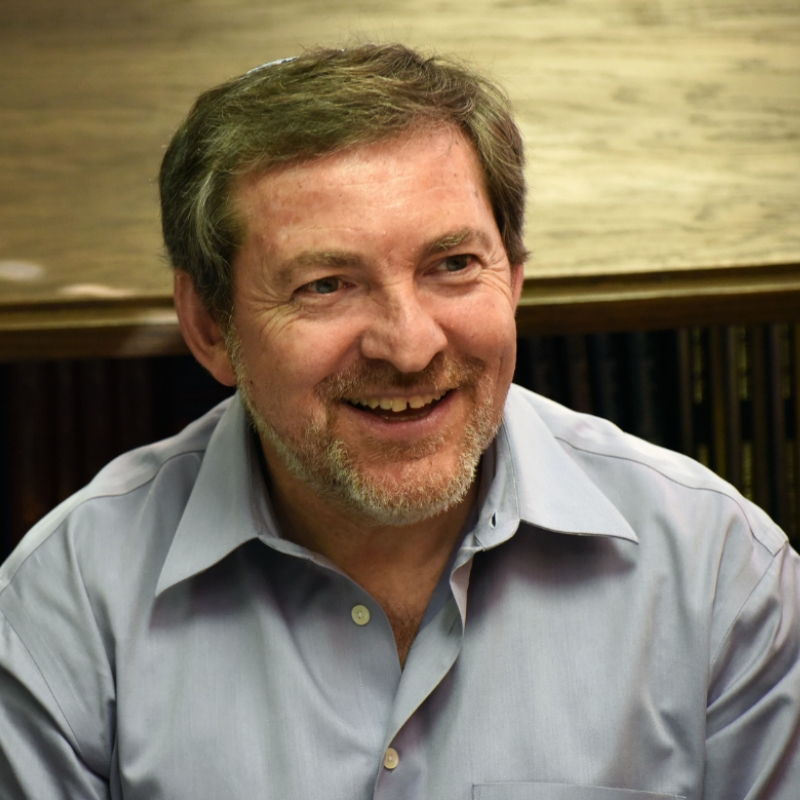Content warning: this d’var Torah contains reference to physical and sexual violence.
I went to Juárez seeking a window into what is happening along our southern border, but I left staring at a mirror of culpability and responsibility.
As part of a delegation from T’ruah and HIAS, I spent time last month along the Texas/Mexico border. We visited shelters in Juárez, a detention center in El Paso, met with those who help refugees and asylum seekers obtain legal protection, tried to walk along the border fence, and heard from individuals with extensive expertise on the history of migration from Central America.
This trip allowed us to bear witness and listen to the stories of migrants — and asylum-seekers in particular — waiting in fear, and desperate for safety. It offered us the opportunity to see firsthand the humanitarian crisis that has been created as the U.S. government has decimated our asylum system, to hear the painful stories of those fleeing unbearable violence and brutality, and to understand the push/pull factors for people leaving those countries. None of the people we met wanted to leave their ancestral homes, but they had no choice. They were fleeing certain death at the hands of brutal dictatorships, corrupt governments, dangerous cartels, and vicious gangs.
For example, at an El Paso shelter, we met a woman from Guatemala. Through tears, she told us about the horrific abuse and poverty that forced her to flee her homeland, leaving behind her mother and son. Her journey to America only added to her pain. As she reached the border, smugglers beat and raped her, leaving her unconscious and near death. She sustained a significant injury which has forced her to spend months at the shelter relearning basic physical functions.
Find more commentaries on Pekudei.
Her story, as well as those told to us by others we met, was a window into how broken our immigration policies are for those seeking asylum and safety. Hearing what she has gone through reminded me of how important it is for religious leaders to speak up and out for the rights, safety, and dignity of asylum seekers at our border, to use our pulpits and our voices in the community to push back against the racist rhetoric that is poisoning any meaningful opportunities to improve and expedite humane border policies.
But her story also forced me to look in the mirror.
For what is driving people to leave their homes in Guatemala, and elsewhere, and put their lives at terrible risk to get to the U.S. border is directly related to Central America’s history of inequality and violence, in which our country has played a defining role.
For decades, motivated by profit or political ideology, this country has intervened in and destabilized these Central American states so aggressively that their political and economic conditions are a direct result of United States action. For instance, as part of an American Jewish World Service delegation to Guatemala in 2020, I learned how we backed the 1954 coup against the democratically elected government. This directly led to the genocide of an estimated 200,000 native Mayans in Guatemala by the military between 1960 and 1996.
The woman we met from Guatemala was not just looking at us to share her story, but staring back at us and reminding us of our own culpability.
Find more commentaries on Immigration.
In this week’s Torah portion, Pekudei, Moses completes the final assembly of the Tabernacle by placing the water basin between the Tent of Meeting and the altar where Aaron and his sons will wash their hands and feet (Exodus 40:31).
This washing station was made specifically from melted-down copper mirrors.
Why were mirrors used to create a basin to purify their hands and feet?
Maybe to remind the priests that before they can act on behalf of the people and ask forgiveness for others, they might want to remember their own flaws.
We need to do the same.
Being in the presence of the woman from Guatemala and listening to what she has had to endure was not only a window reminding me how we must speak up for her but a mirror held up to this country for creating the kind of desperation many people in Central America face today. Her story calls us to act not just out of goodness but out of our own moral responsibility.
Victor Urecki has been the rabbi at B’nai Jacob Synagogue in Charleston, West Virginia, since 1986. This June, T’ruah will honor him with our Lifetime Achievement Award. To purchase gala tickets or make a donation in Rabbi Urecki’s honor, click here.

